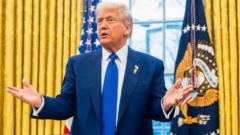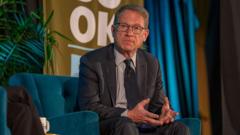The renaming initiatives, including the Gulf of Mexico to the Gulf of America and Fort Bragg's return to its original name, spark debate over America's historical narrative and his nationalist vision.
**Trump's Controversial Name Changes: A Branding Campaign for America?**

**Trump's Controversial Name Changes: A Branding Campaign for America?**
As President Trump reverts key geographical and military names, public sentiment reveals underlying tensions regarding national identity.
In a bold move reflecting his branding acumen, President Donald Trump has embarked on a significant renaming campaign aimed at reshaping the narrative of America itself. On his first day back in office, he signed an executive order to rename the Gulf of Mexico to the Gulf of America. Concurrently, the indigenous name Denali for Alaska's highest peak will revert to Mount McKinley, named after the 19th century president, while Fort Bragg, previously renamed Fort Liberty, will again bear the name of a historic figure, this time Private First Class Roland Bragg, a World War II soldier.
This strategic pivot from Trump aligns with a long-standing tradition among U.S. presidents to alter historical names of monuments to reflect their political vision. Notably, former President Barack Obama restored Denali's indigenous name after lobbying by Alaskan advocates while George W. Bush renamed the Caribbean National Forest in Puerto Rico to honor its local heritage.
The impetus behind Trump's decisions also sheds light on the contentious discourse surrounding the legacy of the Confederacy, particularly in relation to military installations named after Confederate figures. During Trump's presidency, bipartisan efforts led Congress to mandate the renaming of bases linked to those symbols. The recent actions triggered varied reactions among lawmakers and residents, underscoring a cultural clash over American identity.
Trump's choices in this context signal an intention to enhance a nationalistic narrative, professed Professor Allison Prasch from the University of Wisconsin-Madison, framing his actions as part of an imperial vision for the U.S. Renaming the Gulf, for instance, harkens back to moments in American history characterized by territorial expansion and dominance.
Conversely, historians and politicians warn that invoking names associated with controversial figures could trivialize historical grievances, especially those connected to the Confederacy, which has become a focal point for discussions on racial justice and representation in contemporary American society. The view is shared by Connor Williams, who served on a committee recommending the removal of Bragg’s name previously.
Popular opinion surrounding these changes has proven divisive. Polls indicate substantial opposition from the public toward altering the Gulf's name, even in Alaska, where sentiments vary significantly among constituents. A legislative resolution by Alaskan representatives implored Trump to retain Denali's internationally recognized name, arguing it is imperative to respect Native American heritage tied to the land.
As Trump's administration navigates these contentious waters, the potential for enduring legacy remains uncertain. Recent actions, including restricting the Associated Press from using its traditional name for the Gulf in its style guide, have prompted backlash regarding free speech rights. In an era where historical narratives and national symbols are under scrutiny, these name changes do more than alter maps; they provoke critical conversations about America's story and how it perceives itself. Political rhetoric, in this case, becomes the medium by which the presidency seeks to influence public consciousness and identity.






















